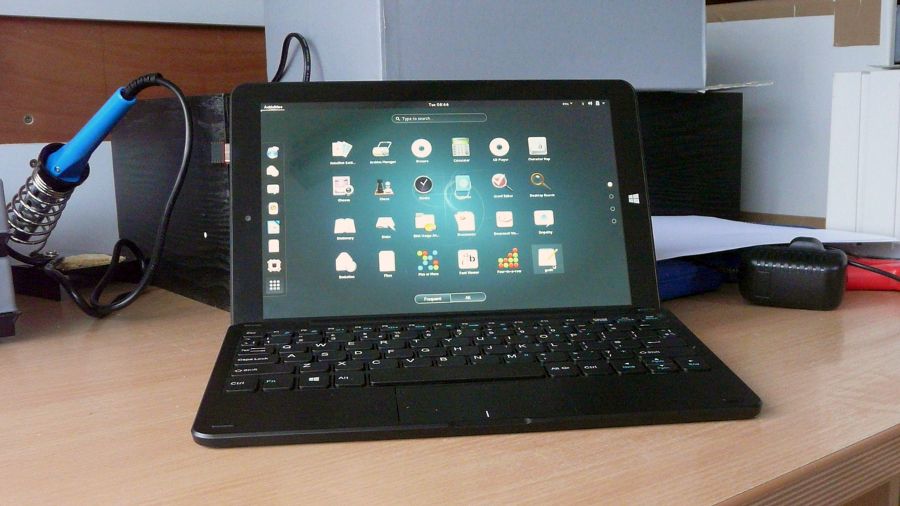How To Install Linux On A Dell Laptop
Welcome to LinuxQuestions.org, a friendly and active Linux Community. You are currently viewing LQ as a guest. By joining our community you will have the ability to post topics, receive our newsletter, use the advanced search, subscribe to threads and access many other special features. Registration is quick, simple and absolutely free. Note that registered members see fewer ads, and ContentLink is completely disabled once you log in.
Hi All, I have just purchased a new Dell inspiron laptop, and trying to install Debian linux. The machine has SSD 32GB and no hard disk. It came with.

Are you new to LinuxQuestions.org? Visit the following links: If you have any problems with the registration process or your account login, please. If you need to reset your password,. Having a problem logging in? Please visit to clear all LQ-related cookies.
Introduction to Linux - A Hands on Guide This guide was created as an overview of the Linux Operating System, geared toward new users as an exploration tour and getting started guide, with exercises at the end of each chapter. For more advanced trainees it can be a desktop reference, and a collection of the base knowledge needed to proceed with system and network administration.
This book contains many real life examples derived from the author's experience as a Linux system and network administrator, trainer and consultant. They hope these examples will help you to get a better understanding of the Linux system and that you feel encouraged to try out things on your own. To receive this Complete Guide absolutely free. Hi All, I have just purchased a new Dell inspiron laptop, and trying to install Debian linux.
Run The Road Vol 1 Rar. The machine has SSD 32GB and no hard disk. It came with windows 10 installed. Intel Celeron 3060.
There is a uefi and secure boot system. I have never even heard of UEFI until today, so had no idea of this new issue - Dell had always been most easy to install Linux. I can get into the bios with F2 key, switch off uefi and/or secure boot and go to legacy boot options, and so get the machine to boot from the USB.
However, the Debian installer does not see the SSD memory - it only gives me options to partition the USB disk which the Debian installer is on. I can also get the machine to boot from USB whilst in UEFI, by booting windows, going into settings, recovery options, advanced options etc But the result is the same. The Debian installer runs fine, but does not see the SSD memory.
I an unsure what kind of problem this even is. Is it about UEFI secure boot? Because Debian installer USB does not have necessary keys? Or something to do with the SSD instead of usual hard disk. Any help greatly appreciated. Most web pages I can find about this issue are talking about windows 8, not windows 10. Dear Timothy, Thanks.
Looks promising. I went to this web page: and found a bunch of options for downloading stretch RC2: for CD for USB for DVD etc and various versions: amd64, arm64, i386. I have generally done this in the past (with Jessie) by downloading an amd64 version (I think) for CD, and then using some program to put the ISO onto a bootable USB. Is that what I need to do now? Or should I go with the 'other images' (netboot, USB stick etc) category?
Or maybe you would recommend a different download site altogether? (I don't think netinstall is a good option because the installer already reported a problem with the wifi drivers (nonfree) on this machine, so I imagine I will have to get that package separately, but that will have to be after install is done.) Cheers. Hi, I tried to address the 'no bootable devices' issue by doing the install again, but this time manually selecting where to put grub / MBR. All of the options I tried failed to install bootloader and all of them gave a message advising that this system appears to be EFI, and offering a workaround option to install elsewhere (removable media?), which also fails. This leads me to believe that, even with UEFI and smartboot disabled, the present problem is UEFI related. Would I be better off trying to install a UEFI aware distribution, such as Ubuntu? Please note that there is a version of this laptop that ships with Ubuntu.
Any help greatly appreciated. I did the following: reinstall windows. Create uefi ready bootable USBs for both Ubuntu16 and stretch. Set boot options in uefi system to enable each of the USBs to boot. With the Ubuntu usb, all works fine and I have run ubuntu live desktop.
With the stretch usb, I had to disable secure boot due to invalid signature, but then the USB boots. I then installed debian stretch and gone to reboot from the SSD. The system does boot from the SSD but after selecting the option to start the OS, there are a couple of text screens saying that file system is good, then a black screen which stays black.